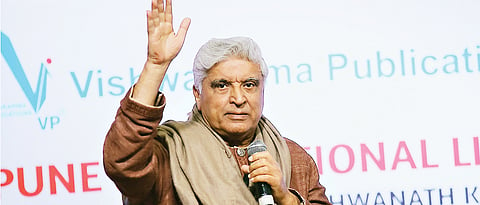

A poet’s vision for the country will be always in contrast with that of a politician. There was no politician present on the dais when Javed Akhtar took the stage at the 7th edition of Pune International Literary Festival, but the overarching influence of certain ideological beliefs could not be dismissed.
The eminent poet-lyricist and scriptwriter rightly commented on the times we live in and the role literature can play. “Society has never been so quiet as it is today. There are two good aspects of literature although they are ostensibly paradoxical. One is, how different people are in Kenya, Australia, North Pole. Secondly, how similar people are, with our sorrows and joys. We are told there are ‘us’ and ‘them’. But literature tells us that there is no ‘them’. We are all ‘us’,” he said during his inauguration speech.
In the ‘Your’s Truly’ session that followed, Akhtar, with his characteristic candour, discussed his life, oeuvre, his vision for India and the many narratives that make up the Indian psyche.
A land of moderates
Akhtar, known for his early work in creating the ‘Angry young man’ on the big screen, believed that the fanatical forces, the people advocating divisive tendencies, won’t succeed because India is a land of moderates. “Go back to your family roots, in your eighth or ninth generation, there will be a kisan, a farmer. We all were farmers. And, what does a farmer do? He tills the land, sows the seeds, and then waits for the rains. He might sing a folk song in between because he knows it will take time to reap what he has sown. He isn’t aggressive by nature. This is our bloodline, our genes and anyone forcing us to go against our genes won’t succeed. Yes, there will be and there are moments of madness and aggression. But, I believe, that’s temporary. The whole of India isn’t on Twitter, so we shouldn’t let it control us. There is a reason why democracy exists in the country. A farmer believes in listening to another view point. He believes in dissension and that’s why democracy has taken roots in this country. Anyone trying to change this narrative has to take a look at other countries where they don’t allow dissension. We can certainly learn lessons on what not to do from one particular neighbour,” he said to a rousing applause.
Art and its creation
The artist, who was introduced to cinema through the iconic movie Aan starring Dilip Kumar, also spoke about the changing graph of cinema, whether art imitates life, and the portrayal of women. In conversation with Urdu poet and journalist Atika Farooqui, Akthar said, “There’s always this discussion on whether society gains something from arts or vice versa. Who or what reflects whom is difficult to say. But I would like to believe that society is more powerful than cinema. Cinema is eventually commerce. A filmmaker wants to make profit and for that, he has to make something that will resonate with the masses. So a wise filmmaker will put his ear to the ground and try to gather what’s happening in society and represent it in films. Cinema takes the intangible thoughts, feelings into words and a common man walks out of the theatre applauding a film, ‘Ah! This is my life that I just watched’,” Akhtar said.
Coming to women in films, Akhtar, who is a seventh generation writer, quoted a dialogue from Yash Chopra’s last film, Jab Tak Hain Jaan. “The heroine in the film says something to this effect, ‘I won’t marry till I have slept with a man of every nationality’. This would have led to a ban on the film if it was made in 1950s. Times have changed. I know questions have been raised about this particular dialogue and the portrayal of women we now see in films. I would however say that the heroine is just expressing her choice of desire, of uttering those words to shock the conservatives. She may or may not do it. But this is her way of rebelling against the society that had kept her repressed. The moral compass isn’t clear, but as days go by, we will gain more clarity,” he added.
Speaking about his work as lyricist for films, he said, “Many times I have been questioned about why I wrote this song or that song. All I will say is this — I write film dialogues or songs for a character or a situation in the film. I don’t see myself or write for myself all the time. So we should look at a film in its entirety. I was questioned why I chose to write Ek do teen.. the popular ditty from Tezaab. Mohini (Madhuri Dixit) was performing in a nautanki and naturally the language had to be different. I was also referring to ‘bara maas’, a tradition that many are not aware of. I just encapsulated the pining of a woman for her lover, into a month, instead of days.”
Read before you write
When asked what tips he had to offer for budding writers and poets, the Sahitya Akademi Award winner said, “Before you write, read. Read a lot. Observe a lot. If you want to write poetry, first read poetry, then remember it, recall it aloud. You will learn the metre, rhythm and syntax.”
Born to Jan Nisan Akhtar, a Communist, Akhtar had finished reading Maxim Gorky, Anton Chekhov by the time he was 13. He also read thrillers that were available at railway stations. His advice is to read classics, but also read Agatha Christies and James Hadly Chases. “Reading serious literature and classics will give you a certain gravitas but will also make you dry, you will become old before you age,” said the artist, who confessed that he lets his heart take decisions and the resultant consequences are defended by his brain.
